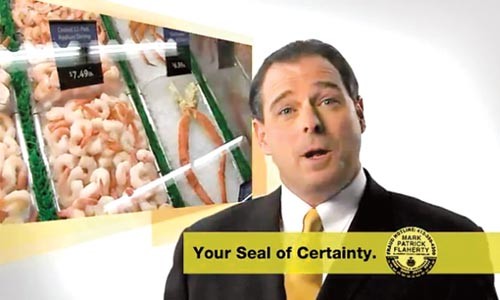Is Allegheny County Controller Mark Patrick Flaherty a dedicated public servant educating his community -- or a seasoned politician with his sights set on future ambitions?
The question has arisen in recent weeks as Flaherty has taken to the television airwaves for three public-service announcements paid for through his political-action committee. The spots advertise his Weights and Measures division's fraud hotline. They show a smiling Flaherty explaining his yellow "seal of certainty" on equipment, indicating its inspection by his office.
In the ads, county inspectors check scales in the meat departments at a grocery store, cash-for-gold shop and pumps at a gas station. The ads end with Flaherty's voice assuring "you get what you pay for" if you see the Weights and Measures seal that appears enlarged on-screen. Then comes the disclosure that the commercial is paid for by the Friends of Mark Patrick Flaherty Political Action Committee.
Some believe the ad is a maneuver to get Flaherty face-time and name recognition among voters; local political insiders mention his name among a potential field of Democratic candidates who could vie for Dan Onorato's county-executive post, should Onorato win the gubernatorial election.
This isn't like using taxpayer money for electioneering; the funds are Flaherty's own. The trouble is that the ads might simply confuse voters as to their purpose.
But does using campaign funds for a commercial automatically make it a campaign ad? Experts say no, and they cite murky state election code as the reason. The code defines campaign or PAC expenditures as anything that affects the outcome of an election.
"What does that mean? There's not sufficient case law. They can use that money for almost anything," observes G. Terry Madonna, a political analyst at Franklin and Marshall College. "I don't think there's much of a downside to using campaign money this way when compared to the way I've seen campaign money used in this state."
Appearances of indiscretion are what Flaherty says he was trying to avoid by paying for the ads himself. "If we're going to do these things -- and I believe in them that much -- and there's some promotional value that could be construed in that in terms of political promotional value, then it should come out of something else other than taxpayer money," he says.
State election officials, however, say that according to the election code, putting the PAC disclaimer on the ad makes it campaign-oriented.
"The question of whether the use of campaign-finance funds automatically makes a message into a campaign ad is unclear. What is clear are those circumstances in which the disclaimer is required. Apparently the Flaherty camp thought it was necessary to add the disclaimer in this instance," says Kevin Murphy, spokesperson for the Department of State, which oversees the bureau of elections. "In that case, we have no choice but to conclude that the ad was intended as a message 'for the purpose of influencing the outcome of an election.'"
Flaherty says he doesn't know the exact cost of the advertisements, seen on WTAE, KDKA and WPXI during the morning and evening news hours "a few times a week," starting after July 4. "It's not cheap, though." Campaign-finance reports aren't due until the end of the year.
Phillip DiLucente, treasurer of Friends of Mark Patrick Flaherty, declined to give a cost. He says the spots are PAC-funded because "[t]here's just not enough [public] money" to pay for them otherwise.
DiLucente says he didn't foresee public skepticism arising when the decision was made to fund the spots. The issues the commercials address are ones the public often overlooks, he says. "It's not costing any of the taxpayers any money whatsoever. I look at this as a win-win for the public."
Observers agree it's unusual for a PSA to be funded by a PAC, and attribute it to Flaherty's caution. Murphy says the spots are a permissible use of PAC money. And experts say they'd be more concerned if the situation were reversed, and taxpayer-funded ads were being used to fund something perceived as a campaign.
Others say the ads inhabit a political gray area. Touting the information of the weights-and-measures function "is useful for citizens to have a follow-up on. On the other hand, does it also promote his personal political ambitions? Yes," says Jennifer Victor, an assistant professor of political science at the University of Pittsburgh. "But our system is designed that way. It's designed [so] that an officeholder can promote what she has done in office as a way of saying, 'What a good job I've done. Vote for me' in a way that's completely consistent with educating the public." Where confusion could arise, Victor says, is if consumers aren't clear on the source of the ad.
Another issue is the fact that county employees are shown in the ad. County officials say the election code doesn't address using employees, while Flaherty says he insisted on recording them "in their line of duty, so it was all done on a regular inspection basis."
But government watchdog groups criticize the practice. "Whether [employees] knew that a PAC would pay for it or not, it's not appropriate to use county employees on taxpayer time in what is, in essence, a political ad," says Tim Potts, co-founder of government integrity group Democracy Rising Pennsylvania.
"If public employees have been used in a political [advertisement] while on the clock and [government] resources were used for a political [advertisement], then there may be a legal violation," notes Barry Kauffman, executive director of Common Cause.
But Flaherty maintains "there's no campaign right now. It's purely about weights and measures." The commercials are the first time his office has made televised public-service announcements. Flaherty says their impetus came from citizen inquiries about the stickers on pumps and devices. He cites state budget cuts, and a movement to privatize the weights and measures function. Therefore, he says it was necessary "to educate the public on what we do on an annual basis in terms of inspecting devices they use on a daily basis. ... Being a taxpayer watchdog, I really believe that it is not a [waste] of taxpayer money if there is promotional value in it."
Allegheny County Democratic Chair Jim Burn Jr. says it's no secret that Flaherty is eyeing the county-executive post should it become vacant. The ads are "doing two things at the same time: showing residents of the county what his office does and getting his name out there for future aspirations."
In any case, beginning a preemptive campaign for Onorato's position may not be a politically savvy maneuver: A Rasmussen Reports poll released Aug. 2 puts Republican candidate State Attorney General Tom Corbett 11 points ahead of Onorato in the race for governor. In the telephone survey, 50 percent of respondents supported Corbett while 39 percent supported Onorato. Eight percent were undecided, and three percent said they prefer another candidate.
"If they are campaign ads, they certainly are premature. I don't see any reason to be running these things in July and August. ... If it's about the county-executive race, we have a chief executive," says county council President Rich Fitzgerald, who says he'll run for the post himself if it's vacant.
If Onorato is elected in November, county council would appoint an interim county executive. An election for a permanent executive would be held in November 2011 (which is when the term expires anyhow).
But when it comes to campaigning, whether a potential election is far off doesn't matter, observers say. Jerry Shuster, a political analyst and professor at Pitt, says getting name recognition "whether in textbook or reality" is the first part of campaigning.
Flaherty is "certainly not going to hurt himself," Shuster says. "Whether Onorato wins is immaterial. He's already getting his name out there."















